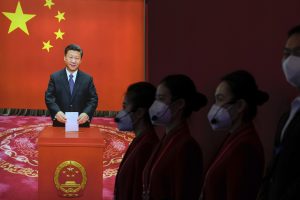Balancing somewhere between loyalty to their leader and loyalty to the Communist Party of China (CCP), members of its Politburo’s Standing Committee (PSC) had to find a way to broker an end to China’s zero COVID policy. Neither China’s economy nor its people were going to be able to take it much longer.
From nano-managing testing, quarantine, and the movements of 1.4 billion people to dismantling the infrastructure that has abounded throughout China for nearly three years, responsibility for managing COVID has now been refined, according to a spokesman for China’s Foreign Ministry. The government, Foreign Ministry Spokesman Wang Wenbin said, has now “issued steps to treat COVID-19 as a Class-B instead of Class-A infectious disease, shifting the focus of our response from stemming infection to preventing severe cases and caring for health. This shift is science-based, timely and necessary.”
Xi Jinping, who has taken credit for the policy and who has therefore tied his personal reputation to it, has himself finally alluded publicly to the dramatic turnaround that China has made during the last several weeks. Xi urged officials to “launch the patriotic health campaign in a more targeted way…fortify a community line of defense for epidemic prevention and control, and feasibly protect people’s lives, safety and health.”
Yet, has this been the sole decision of one man, Xi Jinping? Likely not. A change of policy this consequential and functionally irreversible will have drawn comment and advice from the six men with whom Xi shares membership of the Standing Committee of the Politburo, the highest decision-making body of the Chinese Communist Party and therefore of the country.
It is reasonable to believe that the reversal of zero COVID measures illustrates the power of the Politburo to influence and change not only policies and decisions, but also to impact and sway the directives of its most powerful man, the General Secretary of the CCP and President, Xi Jinping himself.
It must be remembered that Xi does not rule in a vacuum. Xi, not surprisingly, has handpicked men for the PSC who have been loyal to him, but this does not mean that they are all “Yes” men.
Indeed, it is likely that Xi has had frank and straightforward input from those six other PSC members who share the pinnacle of power in China. On COVID measures, it is unlikely that they will have been confrontational with him, as there will have been no need. Most of them have known him and worked with him for years, in some cases decades, and they know one another’s styles, expectations, and the limits of what you can say to the boss.
One of those men is likely to have had seminal input of a sort different from the rest. Wang Huning, the professor-turned-politician, was “discovered” and brought to Beijing in 1995 by Jiang Zemin, beginning his career there as director of the Central Policy Research Office. He rose in the Party as quickly as he had done in academia (in his 30s, he had achieved positions at Fudan University in Shanghai normally reserved for older, more seasoned lecturers). In 2017, Xi picked Wang as a member of the exclusive PSC, renewing that choice this past October.
Wang is thus the intellectual in the room. He has been an advisor and ideological muse to three successive Chinese presidents, from Jiang Zemin on. As Yi Wang wrote in The Diplomat in 2017, Wang Huning’s rise in politics goes against the typical grain of “formal progression up the ranks of officialdom over the years.” On the contrary, “his influence has been more subtle and pervasive, using the strength of his ideas and persuasion, rather than brute force and raw power prevalent in the arena of strongman politics. He has been credited as the mastermind behind the ideological banners of three successive leaders, from Jiang’s “Three Represents” through Hu’s “Scientific Outlook on Development” to Xi’s “China Dream.”
The “face” that many have said Xi has lost by downgrading the nation’s response to COVID-19 is likely a function of the decision of six men who convinced Xi to take his hands off the COVID wheel. Ultimately, the choice was Xi’s, but his colleagues on the Standing Committee of the Politburo wield extraordinary power, as well, and collectively if not individually, can influence.
What is the fallout of this for Xi and his closest comrades? What political price, if any, are they going to pay for stringing China’s massive population along for three years in a quest to beat the spread of the virus, only to now have, within a matter of a few weeks, millions of new cases a day throughout the country, hospitals struggling to cope, and thousands of deaths already reported?
The answer is probably less of a price than had the strictest of COVID-fighting restrictions remained in place. By devolving responsibility down to health authorities and individual citizens themselves, Chinese citizens will likely be as focused on staying safe and healthy as the rest of the world was in 2020 and 2021 in particular, leaving little energy to point fingers or engage in political activism.
Indeed, the damage from China’s lockdowns, both economic as well as psychological, is likely to fade in people’s minds as they now face the more difficult consequence of widespread infection: the loss of family and friends.
Undoubtedly, that has been figured into the calculations of the PSC. If Xi’s comrades on the Standing Committee of the Politburo are strong enough to have wrested control of China’s COVID response from him, then it is interesting to ponder how much power they hold over other critical issues, power which is normally credited to Xi alone. Xi has consolidated power in his PSC, but he may also have created a force that gently puts limits on his excesses. The reversal of China’s zero COVID policy would seem to indicate it, and Wang Huning’s fingerprints are likely all over the new version.
































